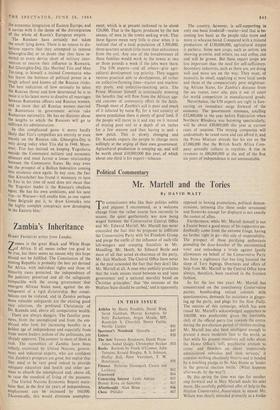Zambia's Inheritance
HARRY FRANKLIN writes from Lusaka: AMBIA is the great Black and White Hope Zof
Africa. It all seems rather too good to be true, but there seems no reason why this hope should not be fulfilled. The Constitution of the coming Republic is probably the best yet devised for Africa, with individual rights and those of minority races protected, the independence of the judiciary preserved and all the safeguards Compatible with the strong government that emergent African States need, against the de- velopment of a rigid dictatorship. But consti- tutions can be violated, and in Zambia perhaps more valuable safeguards are the existing good race relations, the profound Christianity of Kaunda and, above all, comparative wealth.
There are always dangers. The familiar pres- sures, from the unemployed and from the em- ployed who look for increasing benefits in a golden age of independence and especially from trade union leaders jealous of the politicians, are already apparent. The counter to most of them is cash. The economics of Zambia have been soberly examined by United Nations, govern- ment and industrial experts, who are confident that Zambia's prospects are good, but realise that they need to be very good indeed to provide adequate education and health and other ser- vices to absorb the unemployed and, above all, to raise the standard of living of the peasants.
The United Nations Economic Report main- tains that, in the first six years of independence, employment can be increased by 160,000. Theoretically, this would eliminate unemploy- ment, which is at present reckoned to be about 124,000. That is the figure, produced by the last census, of men in the towns seeking work. That these figures mean very little is clear when it is realised that of a total population of 3,500,000, three-quarters scratch little more than subsistence from the soil. Any one of the breadwinners of these families would work in the towns at two or three pounds a week if the jobs were there.
The UN experts—and all others—give agri- cultural development top priority. They suggest various practical aids to development, all rather on collective-farming lines—tractor and machin- ery pools, and collective-ranching units. The Prime Minister himself is continually stressing the benefits that will flow from the African age- old customs of community effort in the fields. Though most of Zambia's soil is poor and much of it infected by tsetse fly, for a vast country of sparse population there is plenty of good land, if the people will move to it and stay on it instead of mining poor soil to a depth of six inches for a few seasons and then having to seek a new patch. This is slowly changing and Dr. Kaunda expects the people to change more willingly at the urging of their own government. Agricultural production is creeping up, and will be worth about £10,000,000 this year, of which about one-third is for export—tobacco.
The country, however, is self-supporting in only one basic foodstuff—maize—and that is be- coming less basic as the people take more and more to wheaten bread. Compared with a mineral production of £130,000,000, agricultural output is pathetic. Some new crops, such as cotton, are showing promise, and others, tea and coffee, can and will be grown. But these export crops are less important than the need for self-sufficiency. Secondary industries, such as there are, are doing well and more are on the way. They must, of necessity, be small, supplying at most local needs and those of the comparatively poor neighbour- ing African States, for Zambia's distance from the sea routes, inter alga, puts it out of court for world competition in manufactured goods.
Nevertheless, the UN experts are right in fore- casting an immediate surge forward of the economy. The government revenues, totalling £32,000,000 in the year before Federation when Northern Rhodesia was booming spectacularly, will be about £50,000,000 this year at current rates of taxation. The mining companies will undoubtedly be taxed more and can afford it, and the Prime Minister already has his eye on the £7,000,000 that the British South Africa Com- pany annually collects in royalties. A rise in revenues to £80,000,000 at the end of the first six years of independence is not unreasonable.


































 Previous page
Previous page